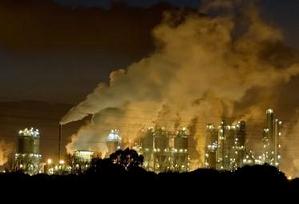
 |
|
|
|---|
| All industries require energy to operate. Energy is also used in transportation and recreation. In addition, we use energy to warm and cool our homes, to cook food, to provide lighting, and to operate many appliances. About 95 percent of the energy used throughout the world comes from oil, coal, and natural gas. These substances are called fossil fuels because they developed from fossilized remains of prehistoric plants and animals. Large deposits of fossil fuels take millions of years to form. The earth has a limited supply of fossil fuels. But the worldwide use of fossil fuels has nearly doubled every 20 years since 1900. As the supply dwindles, the cost of fossil fuels keeps rising. |
 |
|---|
Many nations are working to develop other sources of energy to reduce their dependence on fossil fuels. But every source of energy has some disadvantages that make its development difficult.
Until other sources of energy are further developed, nations must conserve fossil fuels to make the supply last as long as possible. Most of the responsibility for conservation rests with industrialized nations because they consume the majority of the world's energy. The United States alone uses about 25 percent of the world's energy, and it produces only about 20 percent. Higher fuel prices and periodic fuel shortages have forced the United States and many other industrialized nations to develop better conservation programs.
Industries and individuals can conserve energy in many ways. Improved mining and manufacturing techniques can make the industrial use of fuel more efficient. Individuals can save fuel in their homes by installing insulation, which reduces the amount of fuel used for heating and air conditioning. People can set their thermostats at or below 68 °F (20 °C) in winter and at or above 78 °F (26 °C) in summer. These thermostat settings are required in most public buildings by the federal government. People can also conserve energy by using less hot water and turning off unnecessary lights. Motorists can save gasoline by driving smaller cars and by forming car pools. Much gasoline would be saved if more people used public transportation.
The development and use of energy causes many environmental problems. For example, strip mining of coal destroys plant life and exposes the land to erosion. Blowouts of offshore oil wells and leaks from tankers produce oil spills that pollute the oceans. The burning of fossil fuels pollutes the air and results in the formation of acid rain, rain and other precipitation polluted mainly by sulfuric and nitric acid. Acid rain can kill fish in lakes and streams. Sound conservation practices, such as restoring strip-mined land as closely as possible to its original condition, can help reduce environmental damage. Next >>> |
|---|